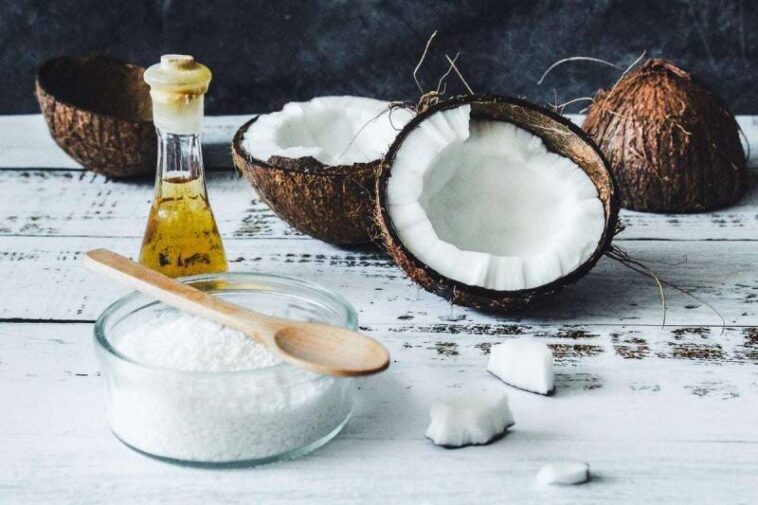
Whether you’ve bought a jar of coconut oil or just picked it up from a store, you might be wondering: does coconut oil go bad? It may have a rancid taste, smell or just seem to be bitter or sharp.
Store in a dark, dry place
Whether you use coconut oil for cooking or hair care, it is important to store it in a dark, dry place. You can also freeze it, which will extend its shelf life.
Coconut oil is a versatile ingredient that has many uses around the world. It can be used as a hair conditioner, a massage oil, or a facial moisturizer. It also has many medicinal benefits. It is popular for its nutritional benefits. It is a rich source of saturated fats.
Storage is important for all types of oils, but coconut oil is especially susceptible to rancidity. Its shelf life is affected by temperature, moisture, and oxygen exposure. If stored in a dark, dry place, it will last for months.
In the kitchen, you can store coconut oil in a cupboard or refrigerator. This should be done with care though. If you leave your oil in the kitchen, it will be exposed to varying temperatures which will cause chemical reactions that can make it go bad.
Coconut oil can also be stored in ice cube trays. These cubes are great for cooking, as well as being easy to freeze. However, the best way to store coconut oil is to keep it in a sealed container. This will prevent mold growth.
Another good way to store coconut oil is to buy a dark bottle. Whether it is a glass bottle or a plastic one, a dark container will help extend the shelf life of the oil.
Coconut oil can be stored in a refrigerator, cupboard, or pantry. The best way to store coconut oil is to keep the container closed after each use. If the container is not airtight, the oil will start to spoil.
Don’t refrigerate
Whether you are storing coconut oil for cooking or for beauty uses, it is important to know how to store it properly. The storage method will determine the lifespan of your coconut oil.
Coconut oil spoils if it is exposed to sunlight or air, or if it is not stored properly. It should be stored in a cool, dry, and dark place. The best storage method will extend the lifespan of your coconut oil.
Coconut oils have a shelf life of at least one year. However, some coconut oils are more prone to spoilage than others. The following steps will help you store your coconut oil in the best way possible.
The first step to storing coconut oil is to find a clear glass bottle with a screw cap. This will help prevent molds and bacteria from growing on the bottle.
When you are ready to use your coconut oil, make sure to store it in a freezer-safe container. If you do not have a freezer, you can keep it at room temperature in a plastic or metal bag. The freezer will help keep the coconut oil fresh for a few months.
If you have coconut oil in a plastic bag or ice cube tray, keep the lid on to prevent bacteria from growing. Then, place the lid back on the container before you place it in the refrigerator.
If you have coconut oil that you want to use right away, store it in a cool, dry, and dark cupboard. The moisture in the air will encourage bacteria to grow.
When you are ready to use your stored coconut oil, gently melt it. Be careful to use only clean utensils. If you use dirty utensils, your coconut oil will spoil quicker.
Taste bitter or sharp
Expired coconut oil will have a distinctive taste and smell. It may also have floating blotchy particles. This is a sign of mold, which may be bad for your health.
The best way to prevent the oil from spoiling is to store it in a cool, dark place. If you keep it in a fridge, it will last longer. A sealed container will also help prevent oxidation.
Coconut oil can have a very long shelf life. If stored properly, it should last for at least two years. However, it can go bad very quickly if not stored properly. Here are some signs that you might have a bottle of coconut oil that is headed for the trash can.
The aforementioned coconut oil should also be stored in an airtight container. A seal will help keep out oxygen and prevent oxidation. You may also want to keep the oil out of direct sunlight, which shortens the shelf life.
Coconut oil can be stored in either solid or liquid form. You’ll want to store the oil in a cool, dark place, such as the refrigerator. The temperature will determine whether it is liquid or solid. This should be done to prolong the life of the oil, as well as its quality.
The other obvious way to store the coconut oil is in a glass bottle or jar. If you don’t have a glass bottle, you could also try storing the oil in a mason jar. This will allow you to take the oil out when you need it.
One of the most important factors in storing coconut oil is the storage temperature. You want to store it at temperatures below 75 degrees, as this will ensure that the oil stays solid. If the temperature rises, the coconut oil will change from solid to liquid.
Smell rancid
Whether you are using coconut oil for food preparation or to clean your home, you may want to check if it has gone rancid. When an oil becomes rancid, it produces free radicals, which can cause inflammation and damage your cells.
If you are unsure about whether your oil has gone rancid, it is a good idea to check its smell and appearance. If it smells foul, it is probably safe to discard.
Coconut oil is made up of 92% saturated fat. It has a high melting point, making it heat-stable at temperatures of up to 350 degrees Fahrenheit.
To test an oil’s rancidity, you can either smell it or take a taste test. Some oils are more difficult to smell than others, but a few tricks can help you figure out whether your oil has gone bad.
The smell of rancid coconut oil can be pretty pungent. It’s not pleasant to smell and can ruin the scent of your hair or skin.
However, you can do a test that can tell you whether an oil is running out of steam. It is called the deodorization index, and it was developed to detect the odor of rancid oils. It uses a scale from zero to five.
The deodorization index is a simple test that uses your sense of smell. If the oil smells different than when you bought it, it’s probably rancid. You can perform the test at home.
The best way to perform the test is to whiff the oil. If it has a smell that’s similar to old oil, it’s probably safe to use. If it’s not, it’s probably not rancid.
Another test to look for is to see if the oil changes color. If it changes from transparent to dark brown, it may be rancid.
Liquefy
Whether you have a bottle of coconut oil or are making your own, liquefying it before it goes bad is a good idea. Not only is it a simple task, but it has many uses.
One of the easiest ways to liquefy coconut oil is to use warm water. You can put the jar in a sink or even a bathtub. Warm water will melt the coconut oil and give it a texture.
A better option is to put a few drops of warm olive oil in the coconut oil. This method liquefies the oil in a few minutes. Another option is to use a microwave.
When liquefying coconut oil, it is important to heat it slowly. If it is heated too fast, the oil will turn rancid. It can also taste bitter. This is because it is going to have some fatty acids removed.
If you want to store your coconut oil, make sure it is sealed after use. You can also use the best by date to estimate when the oil is safe to use.
Depending on the type of coconut oil you buy, it can have a shelf life of about one month or longer. You can also store it in the fridge. It is best to store it away from direct sunlight and away from heat sources.
If you’ve bought a jar of coconut oil, you can liquefy it in the shower. Warm water and steam will help the oil liquefy.
You can also liquefy coconut oil in a microwave. You should be careful when using a microwave. It can destroy the anti-microbial and anti-bacterial properties of the oil. You can also overheat the oil, which will destroy its anti-microbial properties.



